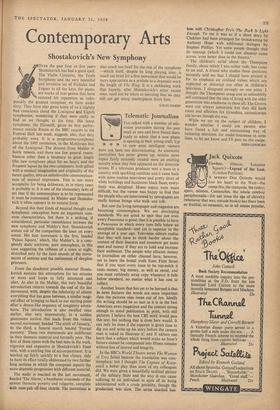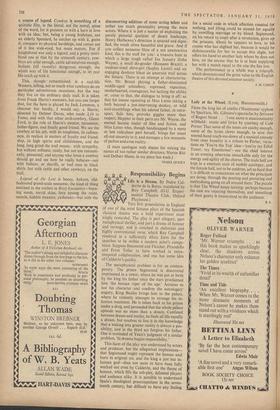Jack Quixote
Cowboy. (Odeon, Leicester Square.)—Legend of the Lost. (London Pavilion). A MODERN Don Quixote would lose his heart to the West—the . camp-fire, the stampede, the rodeo; spurs, saloons, Comanches, the whole cowboy paraphernalia—for not since the age of chivalry (whenever that was, outside books) has there been so fruitful, so romantic, so in all senses popular, a source of legend. Cowboy is something of a quixotic film, in the literal, not the moral, sense of the word, for it presents us with a hero in love with an idea; but, being a young Irishman, not an elderly Spaniard, he catches up with it, grabs it, conquers its physical hardships, and comes out of it less wide-eyed, but more mature. For if knighthood was only a legend, and a pretty mori- bund one at that by the sixteenth century, cow- boys are solid enough, cattle adventurous enough, Indians (till recently) dangerous enough, the whole way of life functional enough, to let real life catch up with it.
This, though- romanticised, is a real-life Western, telling, not so much what cowboys do on particular adventurous occasions, but the way they live on the ordinary daily trail. It is taken from Frank Harris's memoirs, but you can forget that, for the hero is played by Jack Lemmon, a charmer but hardly, I would say, a Harris; directed by Delmer Daves, who made 3,10 to Yuma, and with that other arch-cowboy, Glenn Ford, in the role of Harris's mentor, tormentor, father-figure, and finally good friend. We see the cowboy at his job, with its toughness, its callous- ness, its realism in matters of loyalty and friend- ship, its high spirits and childishness, and the long, long grind the trail means : with sympathy, but without softness; rosily, but not too romanti- cally, presented; and anyone who loves a cowboy should go and see how he really behaves—not with Indians, or sheriffs, or bad men in black shirts, but with cattle and other cowboys, on the trail.
Legend of the Lost is hooey, hokum, old- fashioned grand-scale nonsense, the kind of thing satirised in the trailers in 'Brief Encounter—burn- ing sands, torrid skies, love among the ruins, camels, hidden treasure, yashmaks—but with the
disconcerting addition of some acting talent and rather too much personality among the main actors. Where it is just a matter of exploiting the purely pictorial qualities of desert landscape, Henry Hathaway's direction is assured and digni- fied, the result often beautiful and grave. And if you collect nonsense films of a not unattractive kind, this is the stuff for your a treasure hunt in which a large tough called Joe January (John Wayne), a small do-gooder (Rossano Brazzi), a medium-sized slave-girl (Sophia Loren) and six engaging donkeys blaze an amorous trail across the Sahara. There is an attempt at characterisa- tion, Mr. Brazzi playing a father-dominated middle-aged schoolboy, repressed, rapacious, tenderhearted, courageous, but lacking the ability or, come to that, the dialogue to bring it off; so that his insane squinting at Miss Loren taking a bath beyond a just-intervening donkey, or wild soul-crumblings when his adored father, in retro- spect, fails him, provoke giggles more than respect. Happier in their parts are Mr. Wayne, the eternal laconic loafer of film and fiction, and Miss Loren who, though handicapped by a more or less ridiculous part herself, brings her usual all-out sincerity to it, and manages a few moments of pathos and even reality.
(I must apologise with shame for mixing the names of too rather similar directors, Martin Ritt and Delbert Mann, in my piece last week.)
ISABEL QUIGLY







































 Previous page
Previous page